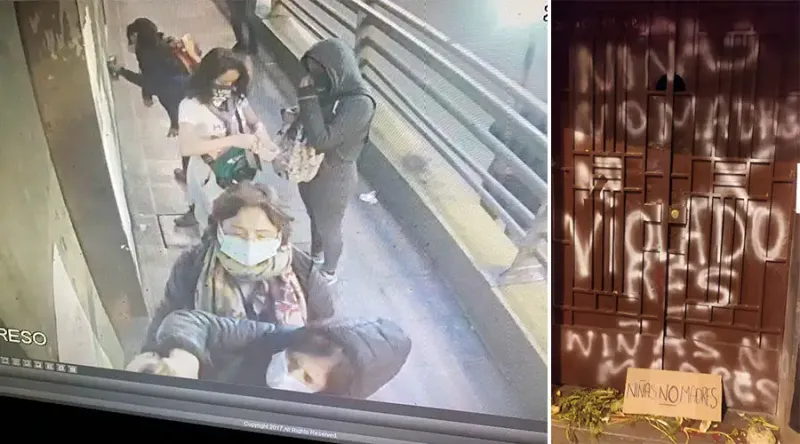
Bolivia’s People’s Ombudsman led march that attacked offices of bishops’ conference
 Acts of vandalism at the Bolivian bishops’ conference in La Paz, Oct. 27, 2021. / ACI Prensa.
Acts of vandalism at the Bolivian bishops’ conference in La Paz, Oct. 27, 2021. / ACI Prensa.
La Paz, Bolivia, Oct 29, 2021 / 18:33 pm (CNA).
Bolivia’s People’s Ombudsman, Nadia Cruz, together with officials from her office, led a Wednesday march to the offices of the Bolivian bishops’ conference, which some participants vandalized with anti-Catholic slogans.
Under the Bolivian constitution, the People’s Ombudsman’s Office is charged with defending human rights, functioning independently of the government.
The Oct. 27 march took place after some governmental institutions and the Bolivian and international press charged that the Catholic Church in Bolivia had intervened or forced an 11-year-old girl, who was pregnant from rape, to refuse to have an abortion, continue with the pregnancy, and be transferred to a shelter.
Several organizations tried to get the minor to have an abortion; however, the girl and her mother objected.
The girl was discharged from the hospital Oct. 26 and in an Oct. 27 handwritten letter, formally desisted from going ahead with the abortion. The minor was later transferred to a shelter run by the Catholic Church in Santa Cruz de la Sierra, a decision made by the Ombudsman’s Office for Children and Adolescents.
Since then, the charitable action of the Church in Bolivia has been met with attacks and accusations of alleged interference in the decisions of the minor’s family.
Images from Oct. 27 show graffiti and signs stuck to the walls of the bishops’ offices with various pro-abortion messages such as: “no child mothers,” “rapists,” “they’re not pro-life they’re pro-rape,” “get your rosaries off our ovaries,” “if there is rape there is (abortion),” “rapists and perverse priests.” Some signs appear to have been made by children.
In a video, dozens of people can be seen outside the bishops’ offices protesting.
In a statement given to the program “No Lies” which the PAT television network airs, Dr. Susana Inch, the Bolivian Bishops’ Conference’s legal advisor, said that “several of those who were in the attack wore the vests of the Ombudsman’s Office.” Inch said a complaint will be filed against the agency since as “there is property damage” and “the people have been identified.”
“It’s absurd, the way they did it,” she said, and that all legal issues “will be dealt with in the legal system.”
In the same interview, Cruz said she led the violent demonstration.
“If the Bishops’ Conference is concerned about the participation of the Ombudsman’s Office, because it has identified the Ombudsman’s vests, I say to them that I personally went and led the demonstration from the Ombudsman’s Office to the Bishops’ Conference in the exercise of our functions in order to denounce the human rights violations that the Church is committing at this time,” she said.
“If you’re so concerned about property, we wouldn’t be surprised if you are concerned about property and not about the cases of torture that you are carrying out,” she added.
In a statement to the BBC, Cruz accused the Catholic Church and pro-life groups of putting pressure on the girl and her mother “to change their minds and desist from going ahead to terminate the pregnancy.”
The minor became pregnant in the city of Yapacaní in the Santa Cruz administrative district after suffering repeated sexual abuse by her 61-year-old grandfather, who is now under arrest. The girl is 21 weeks pregnant.
Víctor Hugo Valda, the bishops’ Delegate for Health of the Archdiocese of Santa Cruz de la Sierra, told ACI Prensa, CNA’s Spanish language sister news agency, that the Church didn’t interfere or intervene in any way and that as of this moment “no one has spoken not even with the girl nor with the mother.”
“What the Church did was appear in person on Monday at the hospital so that the voice of the girl and the mother who didn’t want to interrupt the pregnancy be respected, and because in addition, forcing her to have an abortion would be a crime. The Church was present for that and to ask about the girl’s condition,” he explained.
Valda also criticized that the Church is being “accused of abducting” the minor.
“To be clear, the institution that made the decision as to where the girl has to go, and that physically transferred the girl, from (the hospital) to the shelter, was the Ombudsman’s Office for Children and Adolescents,” he noted.
The bishops’ delegate for health also reiterated that the Church wasn’t “physically present during the transfer of the minor nor did it participate in the decisions about the girl.”
“They decided to take the girl to this home after the Church publicly offered it,” he stressed.
The bishops’ General Secretariat urged the country’s authorities Oct. 26 to respect and protect the right to life and health of the 11-year-old girl and her unborn baby.
“Both lives deserve to be and must be protected. We affirm that both the rights of the girl, as well as those of the baby growing in her womb, must be protected, since both are innocent and victims of a criminal act” which the perpetrator must be held responsible for,” the Bishops’ Conference said in an Oct. 26 statement.
The bishops stressed “that no one can be forced to perform abortions, not even given the seriousness of sexual violence, because abortion in Bolivia is a crime, even on grounds where it has been decriminalized (such as rape) and no one can be forced, not even the healthcare personnel, to commit this crime.”




